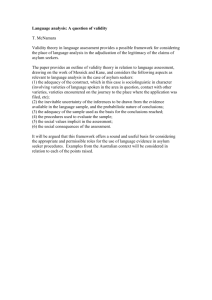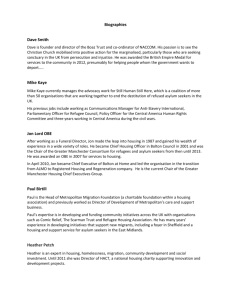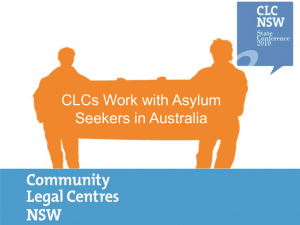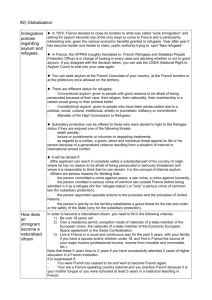information sheet - Immigration Law Practitioners' Association
advertisement
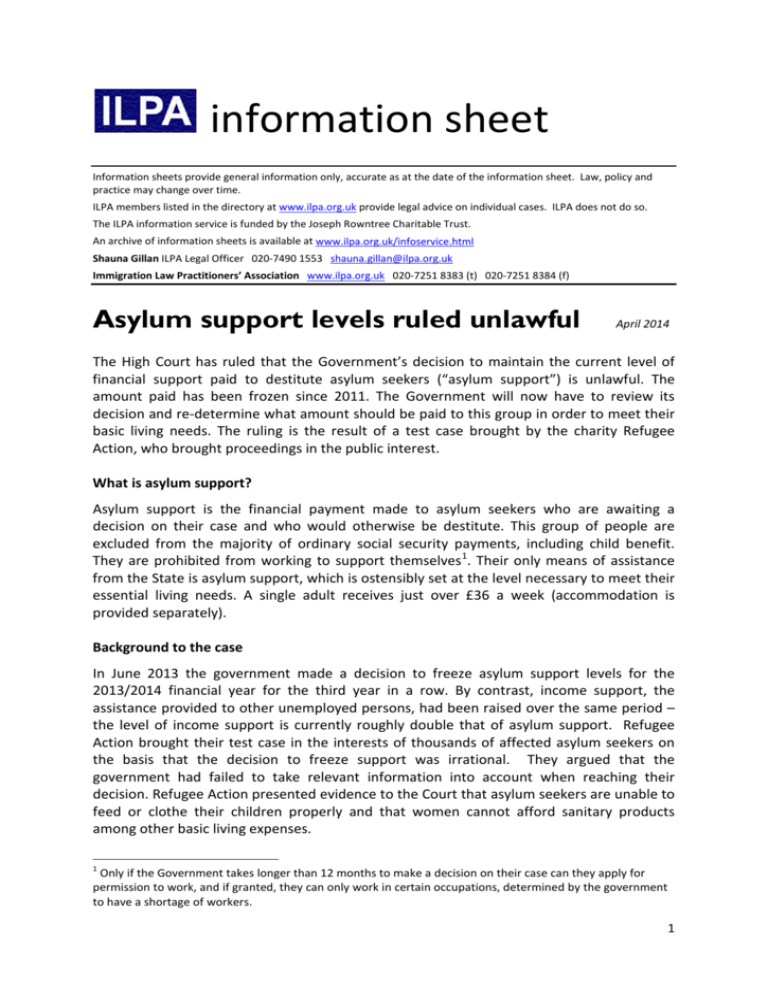
information sheet Information sheets provide general information only, accurate as at the date of the information sheet. Law, policy and practice may change over time. ILPA members listed in the directory at www.ilpa.org.uk provide legal advice on individual cases. ILPA does not do so. The ILPA information service is funded by the Joseph Rowntree Charitable Trust. An archive of information sheets is available at www.ilpa.org.uk/infoservice.html Shauna Gillan ILPA Legal Officer 020-7490 1553 shauna.gillan@ilpa.org.uk Immigration Law Practitioners’ Association www.ilpa.org.uk 020-7251 8383 (t) 020-7251 8384 (f) Asylum support levels ruled unlawful April 2014 The High Court has ruled that the Government’s decision to maintain the current level of financial support paid to destitute asylum seekers (“asylum support”) is unlawful. The amount paid has been frozen since 2011. The Government will now have to review its decision and re-determine what amount should be paid to this group in order to meet their basic living needs. The ruling is the result of a test case brought by the charity Refugee Action, who brought proceedings in the public interest. What is asylum support? Asylum support is the financial payment made to asylum seekers who are awaiting a decision on their case and who would otherwise be destitute. This group of people are excluded from the majority of ordinary social security payments, including child benefit. They are prohibited from working to support themselves1. Their only means of assistance from the State is asylum support, which is ostensibly set at the level necessary to meet their essential living needs. A single adult receives just over £36 a week (accommodation is provided separately). Background to the case In June 2013 the government made a decision to freeze asylum support levels for the 2013/2014 financial year for the third year in a row. By contrast, income support, the assistance provided to other unemployed persons, had been raised over the same period – the level of income support is currently roughly double that of asylum support. Refugee Action brought their test case in the interests of thousands of affected asylum seekers on the basis that the decision to freeze support was irrational. They argued that the government had failed to take relevant information into account when reaching their decision. Refugee Action presented evidence to the Court that asylum seekers are unable to feed or clothe their children properly and that women cannot afford sanitary products among other basic living expenses. 1 Only if the Government takes longer than 12 months to make a decision on their case can they apply for permission to work, and if granted, they can only work in certain occupations, determined by the government to have a shortage of workers. 1 The Judgment While the Courts are unable to make a decision themselves as to what is the correct amount of financial support (a matter for Government to decide), the High Court is able to review Government decisions to ensure they are lawful and to take all relevant information into account. The Court held that the UK has a duty under European Union law to provide a basic level of support to asylum seekers. It held that the decision to freeze the rates of payment amounted to “a reduction in real terms from what was regarded in 2007 as the bare minimum level necessary to avoid destitution”. The Court identified particular categories of essential living costs that had been overlooked by the Government when setting the rates of support: for example, nappies, baby clothes and other baby products, non-prescription medication, washing powder and cleaning products. These were relevant and the Government had failed to take account of them in reaching its decision as to where to to fix the level of support; the decision was thus ruled unlawful. What will the impact of the decision be? It is not yet known whether the Government will appeal the ruling. If the decision stands, it will mean that the Government will have to reconsider the level of asylum support payments and it is probable that when all relevant information is taken into account the payments will need to be raised. This will affect more than 20,000 asylum seekers currently in receipt of this basic financial support. The case could also have wider ramifications for other payments made to similar groups – for example failed asylum seekers, who are supported at an even lower level under a separate statutory scheme. The importance of test cases In future these kinds of test cases will be more difficult to bring if the planned changes to judicial review are brought in via the Criminal Justice and Courts Bill. The Bill contains provisions which would make it more difficult for charities like Refugee Action to get Protective Costs Orders to enable them to bring these kinds of public interest test cases (Refugee Action were granted a Protective Costs Order in this case – which limited their exposure to paying the Government’s legal costs if they lost). For more information about this Bill and Protective Costs Orders see ILPA’s Information Sheet: Criminal Justice and Courts Bill. Further Information You can read about Refugee Action’s campaign to have asylum support levels raised here (“Bring back Dignity”): http://refugee-action.org.uk/policy_campaigning/campaigns /1152_bring_back_dignity_to_our_asylum_support_system The full judgment is available here: R (On the Application Of Refugee Action) v The Secretary of State for the Home Department [2014] EWHC 1033 (Admin) 2
